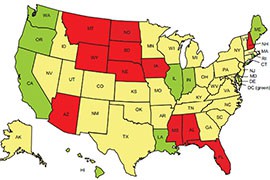- Slug: BC-CNS-Traffic Report,530
- Sidebar: Arizona’s grade, by category
- Photos available (thumbnails, captions below)
By WHITNEY OGDEN
Cronkite News Service
WASHINGTON – Arizona continues to fall “dangerously behind” in its adoption of key traffic and vehicle safety laws, according to a national report that ranked states Wednesday.
Advocates for Highway and Auto Safety graded states on the rate at which they have adopted 15 laws that it believes are vital to better road safety. Arizona was one of 11 states the report marked in red, a “dangerous” zone for their failure to have sufficient numbers of the “key” safety laws a single state should have.
“It’s been really challenging in Arizona,” said Catherine Chase, vice president of government affairs at the association. “I’m not sure if it’s the mentality of the state or the lack of political leadership.”
Arizona lacks nine of the 15 key safety laws ranked in the report, including an all-rider motorcycle helmet law and primary enforcement for seat-belt use – two laws required to have in order to receive a passing grade.
Six of the nine the state missed out on are graduated driver-license laws, which phase in a teen driver’s ability to fully use his or her driving privileges.
“It’s really kind of shocking,” Chase said of Arizona’s failure to approve graduated licenses. “Traditionally those tend to be a little easier to get passed … they’re affecting teenage drivers.”
Arizona showed almost no improvement from last year’s report. It failed in that time to pass an all-driver text messaging restriction, one of the laws pushed in the report.
State Sen. Steve Farley, D-Tucson, agreed that Arizona must focus on passing the statewide ban on texting while driving.
“It’s a major issue,” said Farley, adding “we need to make it safer for Arizona.”
Farley was the first state lawmaker in the nation to call for a ban on texting behind the wheel in 2007. Since then, 37 states have passed statewide bans – but not Arizona.
Several cities in the state, like Phoenix, have enacted some form of restrictions on texting while driving, but that was not enough for Arizona to get a passing grade in this category.
Rep. Victoria Steele, D-Tucson, who is working with Farley to get a ban on texting behind the wheel, said it is time for action on the issue.
“When we’re texting while we’re driving, we’re putting everyone else’s lives at risk,” Steele said. “We don’t need to see more people die as a result of distracted driving.”
But Farley said he does not expect his bill to get through the Senate easily. His bill was assigned to multiple committees for review Wednesday and received “strong support from prominent members in the Senate,” but he does not expect support from Senate leadership.
Chase said Arizona, like most other states in the “dangerous” zone, lacks leadership to get these laws passed.
“It takes some bold political leadership to get these passed,” she said.
Chase said it has been a fight in Arizona for even the simplest of laws, but people must push legislators to act.
“We have the research, we have the data that show they’re effective,” she said of the laws. “So get them on the books and start saving some teenage lives, and everybody who is sharing the road with these teens.”
^__=
Web Links:
_Report: https://www.dropbox.com/s/5rzrum6g2d1b5s0/2014%20Roadmap%20Report%20FINAL.pdf
_ Farley’s bill (SB 1147): http://www.azleg.gov/legtext/51leg/2r/bills/sb1147p.pdf
^__=
SIDEBAR:
Road rate
The Advocates for Highway and Auto Safety annually rates states on their traffic safety laws, giving them green, yellow or red marks. In five categories – measuring 15 laws – Arizona got two greens and three reds in the 2014 report:
– Booster-seat law: Green
– Impaired driving (ignition interlock devices, child-endangerment and open-container laws): Green
– Graduated driver-licensing program: Red
– All-driver text-messaging restriction: red
– Occupant protection (primary seatbelt laws in front and back seats, all-rider motorcycle helmet law): Red
Arizona was one of 11 states in the “dangerous” zone for their failure to adopt what the Advocates for Highway and Auto Safety considers essential traffic safety laws, according to a new report by the association (Map courtesy Advocates for Highway and Auto Safety)
Jacqueline Gillan, left, and Catherine Chase of the Advocates for Highway and Auto Safety at the release of the association’s 2014 ranking of states for highway-safety laws. Arizona, once again, finished near the bottom in the association’s estimation. (Cronkite News Service photo by Whitney Ogden)

